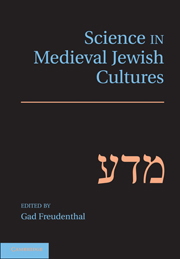Book contents
- Frontmatter
- Contents
- Contributors
- Preface and Acknowledgments
- Introduction: The History of Science in Medieval Jewish Cultures
- Part I The Greek-Arabic Scientific Tradition and Its Appropriation, Adaptation, and Development in Medieval Jewish Cultures, East and West
- 1 The Assimilation of Greco-Arabic Learning by Medieval Jewish Cultures
- 2 Medieval Hebrew Translations of Philosophical and Scientific Texts
- 3 Arabic and Latin Cultures as Resources for the Hebrew Translation Movement
- 4 The Production of Hebrew Scientific Books According to Dated Medieval Manuscripts
- Part II Individual Sciences as Studied and Practiced by Medieval Jews
- Part III Scientific Knowledge in Context
- Name Index*
- Subject Index*
2 - Medieval Hebrew Translations of Philosophical and Scientific Texts
A Chronological Table
from Part I - The Greek-Arabic Scientific Tradition and Its Appropriation, Adaptation, and Development in Medieval Jewish Cultures, East and West
Published online by Cambridge University Press: 05 June 2012
- Frontmatter
- Contents
- Contributors
- Preface and Acknowledgments
- Introduction: The History of Science in Medieval Jewish Cultures
- Part I The Greek-Arabic Scientific Tradition and Its Appropriation, Adaptation, and Development in Medieval Jewish Cultures, East and West
- 1 The Assimilation of Greco-Arabic Learning by Medieval Jewish Cultures
- 2 Medieval Hebrew Translations of Philosophical and Scientific Texts
- 3 Arabic and Latin Cultures as Resources for the Hebrew Translation Movement
- 4 The Production of Hebrew Scientific Books According to Dated Medieval Manuscripts
- Part II Individual Sciences as Studied and Practiced by Medieval Jews
- Part III Scientific Knowledge in Context
- Name Index*
- Subject Index*
Summary
What follows is a first attempt at a chronological table of Hebrew translations from Greek, Arabic, Judeo-Arabic, and Latin of medieval works of science and philosophy, made circa 1100–1500. The table includes both extant and lost translations and complete or partial ones, but generally excludes mere paraphrases, reworkings, commentaries on translated works, quotations from works, and compositions of dubious origin (if their “translated” character is uncertain). Here “science” covers physics, mathematics, astrology, and medicine as they were understood in the Middle Ages. It also includes works on grammar because they often contain explanations of philosophical and scientific terms. However, as a rule, it excludes pseudo-scientific texts (e.g., hermetical, magical, and alchemical works) and texts of a fundamentally religious character (e.g., a number of minor works by or attributed to Maimonides), although some include passages or arguments of philosophical interest. Usually the table supplies the Hebrew titles of the translations; in some cases, they could not be given or are placed in parentheses (when different titles appear in different manuscripts or when they were simply not transmitted by the manuscript tradition).
For most entries, short bibliographical data are given, listing major editions and important studies. Bibliographical references do not include these standard works: Moritz Steinschneider, Die Hebraeischen Übersetzungen des Mittelalters (Berlin, 1893); E. Renan [and A. Neubauer], Les Rabbins français du commencement du XIVe siècle, in Histoire littéraire de la France, Vol. XXVII (Paris, 1877), pp. 431–734; idem, Les Écrivains juifs français du XIVe siècle, in Histoire littéraire de la France, Vol. XXXI (Paris, 1893), pp. 351–789 (where Provençal Hebrew translators of the period 1250–1350 are studied); nor do they include the relevant entries (if any) in the 1971 edition of the Encyclopedia Judaica.
- Type
- Chapter
- Information
- Science in Medieval Jewish Cultures , pp. 17 - 73Publisher: Cambridge University PressPrint publication year: 2012
- 4
- Cited by



